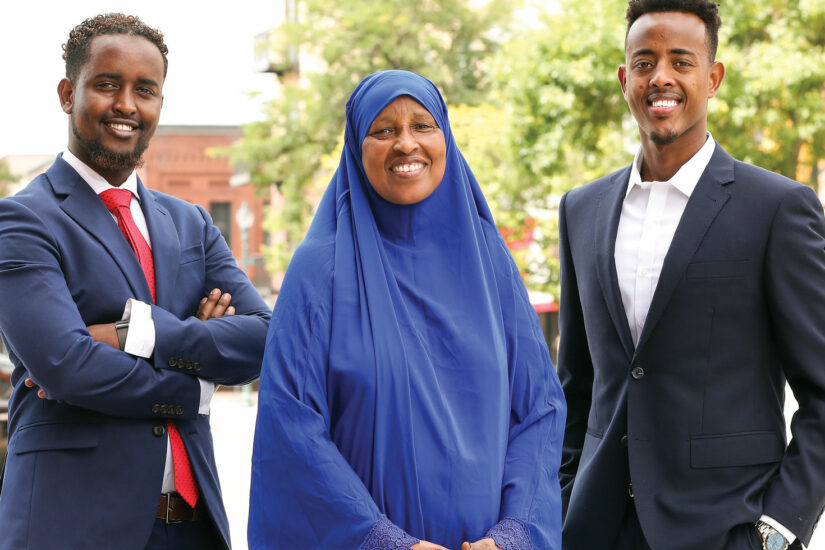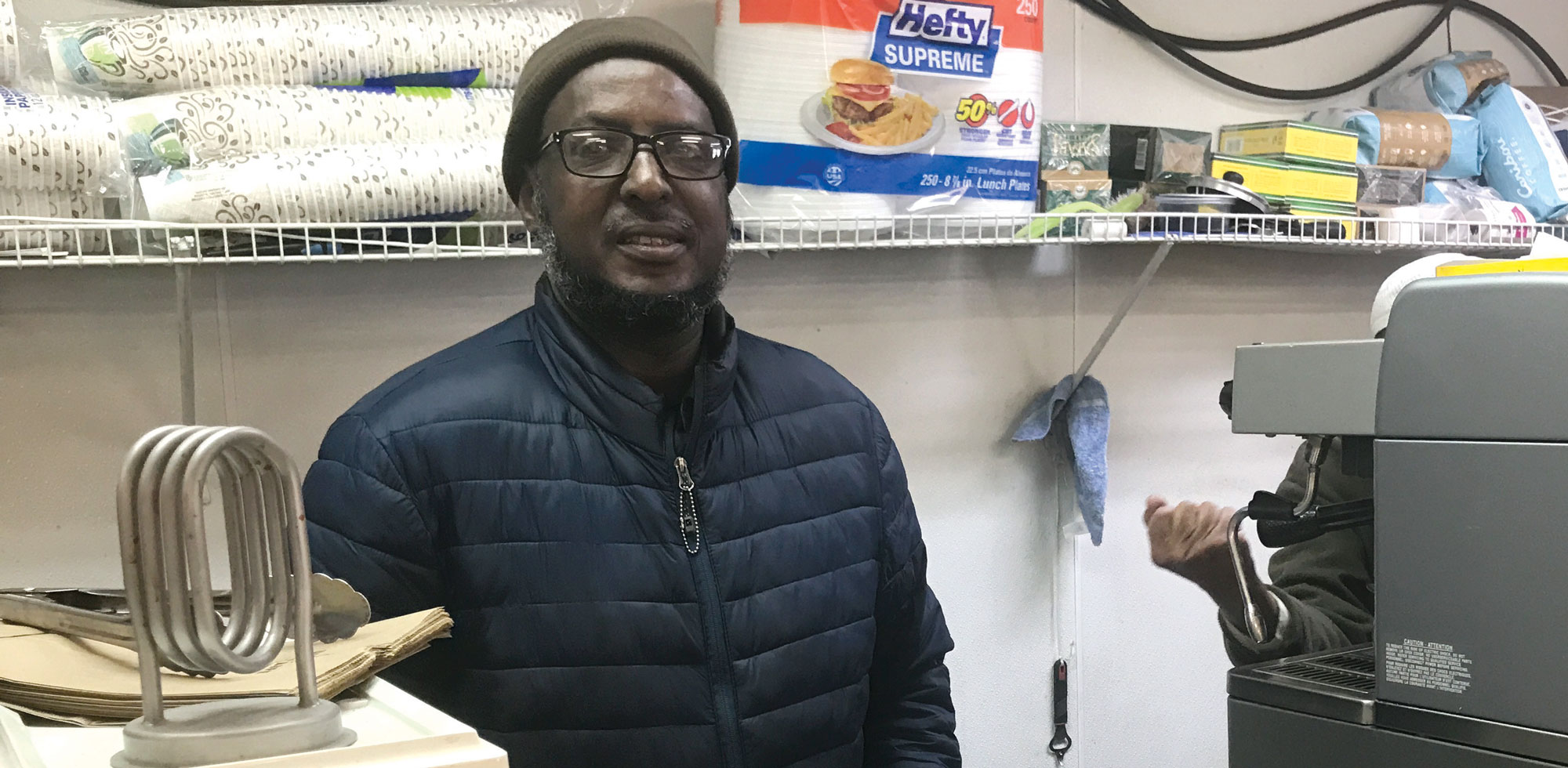
Embracing the American Dream
The Enterprise Academy gives entrepreneurial immigrants the tools they need to start their own businesses.
By John Reinan | Photography by Paul Middlestaedt
You’d think that someone with three college degrees and a master’s in business administration on the way wouldn’t need advice on running a business. That’s not how Ahmed Ali sees it.
Ali, a recent graduate of the Initiative Foundation’s Enterprise Academy, said the experience was vital to him as he prepared to launch his business, Fortune Trucking.
“It is an amazing program for potential entrepreneurs,” said Ali, 35, a St. Cloud resident who was born in Somalia. “I have been able to learn from people with significant experience about marketing my business, putting business proposals together, balance sheets and other financial statements.
“These are people who are entrepreneurs, who have been there and done it.”
That’s exactly what the Initiative Foundation hoped for when it began planning the academy three years ago. The idea grew from a simple statistic that jumped out at Foundation strategists: While the population of Central Minnesota was about 9 percent people of color, only about 3 percent of businesses were minority-owned.
“Three of our top strategic goals were to help new entrepreneurs get started, help existing entrepreneurs expand and help financially disadvantaged populations,” said Jeff Wig, the Foundation’s vice president for entrepreneurship. Helping the region’s growing East African community seemed like a natural fit.
It’s a community that doesn’t need much of a nudge, said Abdirizak Jama, the Initiative Foundation’s program specialist who coordinates the Enterprise Academy.
“The East African culture is entrepreneurial. It’s in the DNA,” said Jama, who was born of an Ethiopian father and a Somali mother, and grew up in a Kenyan refugee camp before coming to America in 2010, at age 15.
“From an early age, it’s a culture that really values independence, yet is collective,” Jama said. “The traditional spice routes go through that area. So, culturally, the people have always been merchants.”
Added Wig: “The entrepreneurial spirit is embedded in the East African community. Nobody bats an eye if you say you’re going to start a business. In fact, it’s kind of expected.”
But there’s a big difference between running a small food stand in a refugee camp and opening a business in the United States, where the financial, logistical and regulatory barriers are much higher. That’s where the Enterprise Academy comes in.
Beyond the Classroom
Enterprise Academy students meet weekly for three months, three hours a week. They hear from experts across a range of foundational business subjects: planning, marketing, finance, regulations.
And the program offers support well beyond the classroom. Academy graduates get one-on-one mentoring and technical assistance, and are eligible to apply for financing of up to $50,000 from the Foundation.
“The Initiative Foundation started doing business lending during our first year of operations in 1986,” Wig noted. “Helping our newest Americans achieve the American dream of owning their own business is a natural extension of what we’ve always done.”
Before starting the Enterprise Academy in early 2018, the Foundation engaged in an intensive, community-based outreach and planning process, convening a working group of Somali-American community leaders as well as figures from the economic development arena in St. Cloud and Central Minnesota.
The group of about 20 people met every other month for 18 months. Its charge was to identify barriers and opportunities for new East African residents looking to enter the business world.
“Understanding what it takes to start a business, you have to be more careful and plan more strategically,” said Jama. “Here in the States, it can take $50,000 to start a business, as opposed to having $1,000 and starting a micro-level business in Africa.
“You have to register, get permission from the cities,” he said. “You have to think about reaching out to a larger customer base.”
Many community organizations have provided expertise and financing to the Enterprise Academy, including the Greater St. Cloud Development Corporation, St. Cloud State University and the Small Business Development Center. St. Cloud Mayor Dave Kleis has been an enthusiastic supporter.
Wells Fargo made a “very low-interest loan” of $600,000 in seed money and also made a grant of $200,000. “That was what allowed us to green-light the program,” Wig said. The Central Minnesota Community Foundation contributed $150,000, and the Ewing Marion Kauffman Foundation of Kansas City, Mo., contributed $50,000, through a subgrant from the Twin Cities-based Neighborhood Development Center, whose work in the metro provided a model for the Enterprise Academy.
Planning for the Future
So far, two academy classes with a total of 17 students have graduated. The areas drawing the most interest from the budding entrepreneurs are food and transportation; other potential businesses are in medical services, retail and personal care.
Ali, the trucking company owner, said the program benefits go beyond the classroom.
“It’s also an opportunity for networking,” he said. “There are a lot of opportunities for learning, for growth, for development, for financial support.
“The academy is a community resource that I would definitely recommend.”
Abshiro Hussein Mayow, 25, is a biologist and an academy graduate who is Somali-American. She grew up in St. Cloud and hopes to open a medical scribe business.
The academy experience, she said, was extremely valuable in helping her plan for the future.
“Being a scientist, you already know how to make something successful because we run experiments, we do studies,” she said. “But business is different.”
After going through the Enterprise Academy, she decided she’d be better off taking a longer-term view of her business plans. Mayow intends to go to medical school, and she believes she’ll be better positioned to run her scribe business with a medical degree.
“I will have more credibility with hospitals and clinics by being a doctor,” she said. “The academy actually helped me make realistic goals on how I want to proceed with this idea. But I will be working and planning for this business in the coming years. This is something I want to do.”
In the years to come, the Initiative Foundation hopes to expand the Enterprise Academy to ambitious entrepreneurs in other low-income communities in Central Minnesota. The lessons learned will make the program even more effective, Wig said.
“Central Minnesota can’t reach its full potential until we tap the talents of all our entrepreneurs,” said Wig. “That’s crucial to our region’s future success.”
HUSSEIN FARAH
33RD MEAT & GROCERY
Enterprise Academy graduate Hussein Farah, owner of 33rd Meat & Grocery, has secured a culturally adapted Initiative Foundation loan to add a kitchen and deli to his St. Cloud business.
